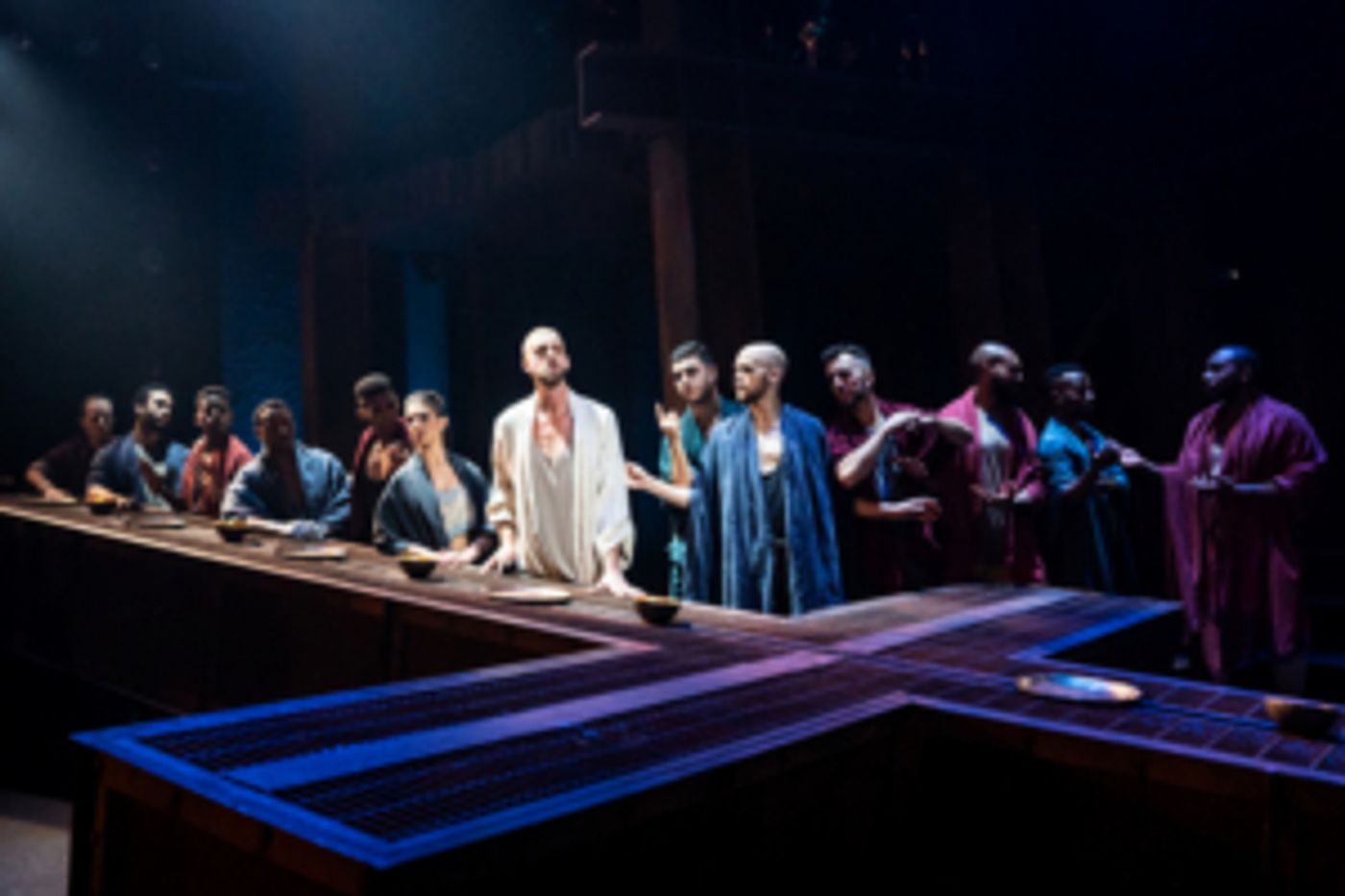Review Roundup: JESUS CHRIST SUPERSTAR 50th Anniversary Tour - The Critics Weigh In!
Read All the Reviews

Andrew Lloyd Webber and Tim Rice's iconic musical, Jesus Christ Superstar officially launched the 50th anniversary tour at Austin's Bass Concert Hall on October 8th before visiting over 30 cities including Los Angeles, Denver, Nashville, Dallas and Chicago.
The cast is led by Aaron LaVigne (Spider Man: Turn Off The Dark, RENT) in the role of Jesus along with James Delisco Beeks (Kinky Boots, Aida) as Judas, Jenna Rubaii(Groundhog Day, American Idiot) as Jesus' devoted follower Mary and Alvin Crawford(The Lion King, Candide) as Caiaphas.
For additional information about this production, please visit JesusChristSuperstar.com.
Let's see what the critics are saying!
Syracuse, NY
Natasha Ashley, BroadwayWorld: The new interpretation of the musical makes the audience feel like they are right in the middle of a rock concert. The staging, the lights, the costumes, the choreography, use of hand-held microphones, and the use of instruments allow for of plenty expression from the entire cast. The energy is intoxicating and the choreography by Drew McOnie is refreshing. The new tour is obviously updated, especially visually, and the story itself is quite timeless as well as the rock inspired musical numbers. It is now fifty years since the musical's first performance, but the music still feels modern, edgy, and relevant.
Austin, TX
Andrew J. Friedenthal, Austin 360: This rocking, manic, modern take on "Jesus Christ Superstar," helmed by director Timothy Sheader and choreographer Drew McOnie, reclaims the cynicism, desperate questioning and emotional depth of the original 1970 concept album by composer Andrew Lloyd Webber and lyricist Tim Rice. In this version, rather than a feel-good parable about general Christian good will (as many sanitized, anodyne productions of the show have become), we see an epic rock concert gone wrong that has no clear narrative of good or evil, but rather a probing interrogation of the Passion of Jesus that has equal sympathy and scorn for both Jesus and Judas.
Robert Faires, Austin Chronicle: The new North American touring version rises to the challenge by getting back to the concept album's roots, as concert rather than stage play. Building on the acclaimed 2016 revival at the Regent's Park Open Air Theatre in London, the production fully embraces the atmosphere and accoutrements of the rock show. The major set piece is a runway in the shape of a cross. As a matter of course, the performers sing into handheld and standing mics, with stands frequently doubling as props - standards, spears, even the cross Christ is crucified on. Musical instruments are carried throughout, on which cast members accompany themselves and others. Dozens of high-tech lights illuminate the stage, with drifting fog concentrating diffuse beams into blazing shafts. Glitter becomes the surprising - and shocking - vehicle through which we witness the impact of the 39 lashes on Jesus. Every element of the rock show brings with it the energy we associate with that high-voltage event, and also the sense of celebrity ingrained in it, the mesmerizing allure of the charismatic, the famous, the larger than life.
Joni Lorraine, BroadwayWorld: The focus of this production is on celebrity at a breakneck pace with no intermission to slow it down. Keep that in mind when having a cocktail before the show. This also means the true relationships these characters have with each other gets lost in the melee. The staging and concept isolate the main characters from creating bonds with each other and doesn't help with an already scant narrative. But it's a great story to many, anyway. So famous that most of us can fill in the blanks. As a result, though, I didn't take away much when I left. I felt kind of empty. The opportunity to show us a classic powerful story through the relationship of two, dare I say it, iconic characters, gets lost to the idea of celebrity. Perhaps that's the point, though. And that's really sad.
San Jose, CA
Linda Hodges, BroadwayWorld: Jesus Christ Superstar is really a modern Passion Play. These dramatic performances of Jesus' final days have been staged since the 13th century and have unwittingly been the source of anti-Semitism through the ages. The task today is to ensure that the portrayal of the Jewish followers of Jesus, especially after Palm Sunday, contributes to a positive understanding of Christianity's Jewish roots.
Los Angeles, CA
Charles McNulty, LA Times: Aaron LaVigne, who plays Jesus, is a Ryan Gosling-type rocker with a man bun. Stylishly lanky, he suffers fashionably and sings erratically. He can wield a hand mic with the studied cool of Adam Levine, but his voice can't transcend its limitations. The spirit is willing but the notes are weak. James Delisco Beeks' Judas has the assured vocal power of a Luther Vandross, but his hyperactive motion would be better suited to an aerobics video. Jenna Rubaii's Mary Magdalene powerfully enchants when she performs "I Don't Know How to Love Him," but the context of the song is lost in a show that never allows narrative emotion to build.
Deborah Howell, The Wave: The principle performers and the chorus were so magnificently mesmerizing that as the story unfolded we were completely at their mercy. Not a pin drop was heard as guitar-strumming Aaron LaVigne (Jesus) delivered his utterly divine version of "Gesthemane"-- giving it his own extraordinary sensitivity and drawing us in like so many disciples.
Shaena Engle, Patch: The audience follows Jesus (Aaron LaVigne) through his transformation from rock-star adoration to despair and resolution. Both LaVigne and James Delisco Beeks as Judas shine throughout the musical. From his initial dislike of Mary (Jenna Rubaii) to his decision to betray Jesus, Beeks performance grows stronger as the musical heads to its final climatic scene. Rubaii, as Mary, provides a nice balance with a soulful soft rendition of "I Don't Know How to Love Him" and other ballads against strong powerful male vocals.
Tony Frankel, Stage and Cinema: Interestingly enough, as much as I loved it, the three leads are somewhat disappointing - if, that is, you are expecting a blend of rock star vocals and great acting. It may be the fault of Timothy Sheader's direction, which gives Jesus, Mary, and Judas scant sense of backstory and relationship, of which there is precious little to begin with. The leads play second fiddle to the melee and get somewhat lost. Maybe Sheader - who wisely dropped the intermission - thought any of that would get in the way of his hurtling high-voltage trajectory.
San Diego, CA
E.H. Reiter, BroadwayWorld: LaVignine as Jesus has some very strong vocals. He also has a man bun, a guitar, gets a beer when he needs to chill out, and he probably makes his own kombucha. He's not like a regular Jesus, he's a cool Jesus. Beeks as Judas has some outstanding vocal moments, especially in "Damned for All Time" when conflicted over the deal he has just struck to turn over Jesus. Rubaii has as sensitive turn with "I Don't Know How to Love Him." Alvin Crawford and Tyce Green are particularly strong as dastardly and scheming priests Caiaphas and Annas, along with Tommy Sherlock as an excellent Pilate.
James Hebert, San Diego Union-Tribune: The show has a capable, strong-voiced lead trio in Aaron LaVigne (as Jesus), James Delisco Beeks (as the turncoat Judas) and Jenna Rubaii (as the faithful follower Mary Magdalene), and music director Shawn Gough's versatile band does all it can to help Andrew Lloyd Webber's 1970-vintage score feel vital and alive. But what's even less clear than the visual appeal of drop-crotch pants (a look sported by much of the show's cast) is why director Timothy Sheader's concert-style show is so rushed: It comes in at barely 90 minutes with no intermission.
Kris Eitland, San Diego Story: The solos are outstanding, especially Rubaii in "I Don't Know How to Love Him," and Tommy Sherlock as the sinister Pilate. LaVignine as Jesus has strong vocals and plays guitar. But director Timothy Sheader turns this national tour into a blasting rock concert with smoke and eyeball-blasting lights.
Spokane, WA
Carolyn Lamberson, Spokesman: The lead trio of Jesus (LaVigne), Judas (James Delisco Beeks) and Mary (Jenna Rubaii) all possess powerful voices. Beeks especially excels at revealing Judas' anguish as he contemplates betraying his friend (and eventually does). His death scene is effective and affecting. And was he up to the show's iconic track, "Superstar?" Easily. Rubaii nails Mary Magdalene's solo, "I Don't Know How to Love Him," the torch ballad that Helen Reddy and Yvonne Elliman rode to the Top 40 in 1971, and shares a nice duet with Peter (Tommy McDowell) in "Could We Start Again, Please?" LaVigne displays lovely range. From the rocking "The Temple" and "What's the Buzz" to the aching solo "Gethsemane," LaVigne brings a clear passion and nice voice to the role.
Denver, CO
Joe Contreras, Latin Life Denver: The orchestra was phenomenal and was not confined to the orchestra pit but was placed on the second level of the set and spanned the entire stage. The singing was clear and crisp, easy to understand. The acting was moving leaving the audience gasping at what would happen next although every one knew what was going to happen and how it would all end. The resurrection is not part of the play leaving some wondering why.
Tucson, AZ
Kathleen Allen, Tucson.com: There is a lightness to this version, directed by Timothy Sheader (who really shoulders the blame for the rush job). Jesus is smiling the first we see of him. Of course, as crucifixion approaches, those smiles fade away. But Aaron LaVigne, who plays the guitar-strumming Jesus, makes him seem like an actual person. Heck, he even rocked a man bun. And when he sang "Gethsemane," the opening-night audience leaned in and listened with awe. The lyrics "I want to see my God/Why I should die," it seemed like a sincere, devoid-of-self-pity query about this salvation task he's taken on.
Phil Villarreal, Because I Told You So: Not to be upstaged, topknot-donning Aaron LaVigne thrives in the given lead role, leveling the audience with a rockstar performance that adds a welcome masculinity to the traditionally milquetoast interpretations. Jenna Rubaii completes the masterful lead trio as Mary, delivering heartbreaking renditions of "I Don't Know How to Love Him" and "Everything's Alright." A passion play in both the traditional and emotional senses, the production revitalizes "Jesus Christ Superstar," somehow making the show even better than you remembered with a vigor that could be described as heaven-sent.
Omaha, NE
Christine Swerczek, BroadwayWorld: Timothy Sheader takes this musical in a direction that is actually a rerouting to the 1970 album that topped the charts. Less about storytelling through dramatization and more about using music and dance to speak for itself, sound plays a critical role. From where I was seated, the sound was probably the best I've experienced in that venue. Co-designers Keith Caggiano and Nick Lidster did a brilliant job of keeping the softer acoustic melodies and raucous rock in balance. The orchestra was split between the sides of the stage, adding to the surround-sound feel. Along with the precise diction of the performers, there was no reason for anyone to lose a single phrase.
Betsie Freeman, Omaha.com: Performances were first-rate. In the show, the story of Christ's final days is told through the eyes of Judas, and he gets the most high-powered, showstopping songs, including the iconic title tune. James Delisco Beeks has the commanding voice and the acting ability to make the most of the role. Aaron LaVigne is his equal as Jesus. His best moment is "Gethsemane," which starts softly as a ballad and builds to a screaming and agonizing finish. LaVigne gets to use every bit of his considerable talent, including his spot-on falsetto.
Natalie McGovern, The Reader: From the opening of this iconic masterpiece, the energy could be felt as cast members streamed down the aisles, racing to the stage in preparation for the overture to begin. With choreography by Drew McOnie, every movement was stylized and the choreography was sharp, and abrasive, yet enrapturing to watch. The production is edgy and as modern of an interpretation as you probably can get, with elements of biblical mixed into a post-apocalyptic present-day vibe. The styling of costuming is modern as well, daring to expose midriffs, and creating free flowing movement in non-restrictive unisex clothing. Jesus is garbed in white-at times he is in a hoodie or a wife beater, but nonetheless his purity illuminates through in the choice of costuming. The choreography demands it after all, with its fluid motion and cohesive block formations ever changing to reflect characters or situations taking place.
Baltimore, MD
Amanda N. Gunther, Theatre Bloom: Standouts in the production include the gritty Pilate (Tommy Sherlock) who brings an astonishing presence to "Trial By Pilate/39 Lashes." Sherlock, who is fully present in this scene with Jesus and those screaming to crucify Jesus, despite holding a microphone in his hand, delivers a rousing and evocative rendition of this number, really bringing a compassionate, albeit fury-driven, heart forward in the song. Simon (Eric A. Lewis) who receives the self-titled feature solo puts soulful spirit into this song and really amps up the energy of the number.
John Harding, DC Metro: The most dramatic moments here often come in a solo spot at a mic, as when Pontius Pilate (Tommy Sherlock) performs "Pilate's Dream" with just his guitar. Jenna Rubaii has a near-perfect voice as Mary Magdalene, but she moves more like a co-ed on spring break than as a sincere convert confronting her deepest moral convictions in "I Don't Know How to Love Him."
Pittsburgh, PA
Sharon Eberson, Post-Gazette: To further the concert atmosphere that permeates the piece, hand-held or standing microphones are often in use, sometimes doubling as spears or scepters. Aaron LaVigne's Jesus, with a guitar strapped on and ready to rock, stands at a mic to address his flock. LaVigne's "Rent" and symphonic experience are evident on songs requiring a boundless range - "Gethsemane," in particular. With a man bun and a lithe physicality, he embodies the Christ figure as a rocker who goes from mosh-pit glory to a violent end.
- To read more reviews, click here!
- Discuss the show on the BroadwayWorld Forum
Reader Reviews
Powered by
|
Videos






